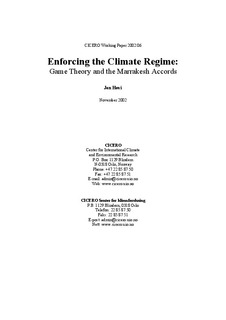| dc.contributor.author | Hovi, Jon | nb_NO |
| dc.date.accessioned | 2014-03-17T14:31:26Z | |
| dc.date.available | 2014-03-17T14:31:26Z | |
| dc.date.issued | 2002 | nb_NO |
| dc.identifier.issn | 0504-452X | nb_NO |
| dc.identifier.uri | http://hdl.handle.net/11250/192356 | |
| dc.description.abstract | This article reviews basic insights about compliance and “hard” enforcement that can be derived from various non-cooperative equilibrium concepts, and evaluates the Marrakesh Accords in light of these insights. Five different notions of equilibrium are considered – the Nash equilibrium, the subgame perfect equilibrium, the renegotiation proof equilibrium, the coalition proof equilibrium, and the perfect Bayesian equilibrium. These various types of equilibrium have a number of implications for effective enforcement: (1) Consequences of non-compliance should be more than proportionate. (2) To be credible punishment needs to take place on the Pareto frontier, rather than by reversion to some suboptimal state. (3) An effective enforcement system must be able to curb collective as well as individual incentives to cheat. (4) A fully transparent enforcement regime could in fact turn out to be detrimental for compliance levels. It is concluded that constructing an effective system for “hard” enforcement of the Kyoto Protocol is a formidable task that has only partially been accomplished by the Marrakesh Accords. A possible explanation is that the design of a compliance system for the climate regime involved a careful balancing of the desire to minimize non-compliance against other important considerations. | nb_NO |
| dc.language.iso | eng | nb_NO |
| dc.publisher | CICERO Center for International Climate and Environmental Research - Oslo | nb_NO |
| dc.relation.ispartof | CICERO Working Paper | nb_NO |
| dc.relation.ispartofseries | CICERO Working Paper;2002:06 | nb_NO |
| dc.title | Enforcing the climate regime: Game theory and the Marrakesh Accords | nb_NO |
| dc.type | Working paper | nb_NO |
| dc.source.pagenumber | 23 | nb_NO |
| dc.identifier.cristin | 331597 | |
